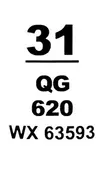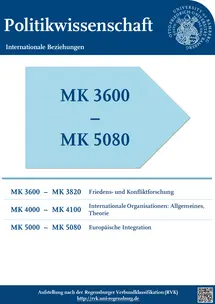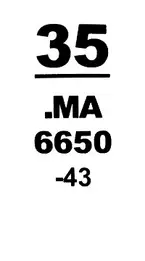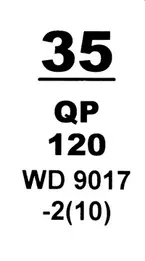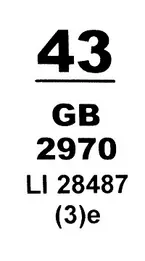Shelfmarks
All items of the Bamberg University Library come with a shelfmark. It indicates the location and check-out terms of each item and contains its classification.
Normally, shelfmarks consist of three parts, the Location Code, Classification, and Accession number. They are listed one below the other on the call number label.
Journal shelfmarks only contain the location code and the classification.
Location codes
The first portion of the shelfmark, which is the location code (LKZ), indicates to which branch library the item belongs and what the terms of use are.
Normally, you will find 2-digit location codes. The first number shows the branch library where a given book belongs (1 = Branch Library 1; 2 = Branch Library 2, etc.). The second number indicates the terms of use and the location of the item within a branch library (e. g. 1 means it's an open stacks item that can be checked out; 3 refers to the textbook collection, 5 refers to open stacks with reduced loan period or reference collections, and 0 describes an item that can be checked out of the stacks).
All 3-digit location codes are used for course and project reserve lists exclusively.
You can find the complete list of all location codes here.
Peculiarities:
- 22: Staatsbibliothek Bamberg (State Library) at Domplatz 8. Items can be reserved through the Online Catalogue.
- 0122: Bibliothek des Metropolitankapitels (Diocesan Library) at Domplatz 2. Items can be reserved through the Online Catalogue.
- 0159: Bibliothek des Erzbischöfliches Priesterseminars (Seminary Library) at Heinrichsdamm 32. Items can only be checked out there.
Classification
The classification indicates the content of media. Based on it, books are arranged in the reading rooms. It is, therefore, also printed on the shelfmark.
A large portion of the holdings of the Bamberg University Library is arranged in accordance with the RVK classifcation system, which is also used by numerous other German academic libraries.
Exceptions
- Educational and psychological literature in Branch Library 2 has a classification of its own: Educational Science [German only], Psychology [German only].
- For Oriental Studies, the Bamberg University Library has somewhat adjusted the RVK to fit our needs and to be able to offer the vast holdings of the linguistics and literature departments (E) more systematically.
The classification numbers for journals are also in line with the Regensburg classifcation system. In order to differentiate volumes, the volume number is added to the classification number.
You can find the complete list of the classifcation numbers for journals here [German only].
Accession number
The accession number is made up of letters and numbers. It is needed to sort books on the shelf within a classification. In some cases, an appendix is added to the accession number.
| Addendum | Example | Remarks |
|---|---|---|
| Volume | -2 | It is used for multi-volume editions and for counting the years/volumes of journals. |
| Edition | (3) | Only if there are several editions available at the Bamberg University Library |
| Copy | a | Only if there are several copies available at the Bamberg University Library |
| Year | (2013) | Instead of the number of the edition, e. g. for reprints |
In Branch Libraries 1 and 2 and for Informatics literature, there can be an additional element between the classification and the accession number, which sorts the material chronologically or alphabetically. Example: 10/xtm 83 CM 3250. In this call number, the year of publication, 1983, is encoded in the number “83”.
Examples
Shelfmarks for doctoral dissertations (up to 2013)
Until 2013, location codes for those doctoral dissertations that were not published with a publishing house consisted of two parts:
- Location code (indicates location and check-out terms)
- Accession number (XA - XG)
Example: 30/.XB 9156
Since 2014, shelfmarks for doctoral dissertations correspond to other books' shelmarks.

